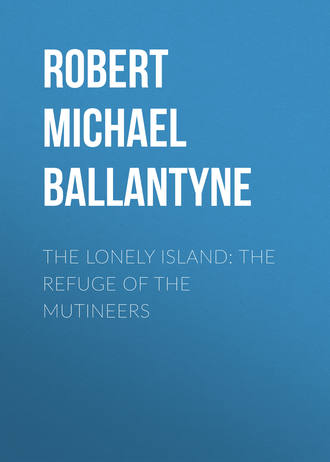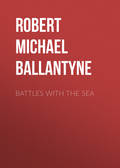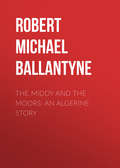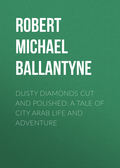
Robert Michael Ballantyne
The Lonely Island: The Refuge of the Mutineers
Reader, if you had seen the joy depicted on Sally’s face, and the rich flush of her cheek, and her half-open mouth with its double row of pearls, while Adams ran over this familiar list, you would have thought it well worth that seaman’s while to tax his memory even more severely than he did.
“And then,” he continued, knitting his brows still more severely, “there’s Gulliver an’ the Lillycups or putts, an’ the Pilgrim’s Progress—though, of course, I don’t mean for to say I knows ’em all right off by heart, but that’s no odds. An’ there’s Robinson Crusoe—ha! that’s the story for you, Sall; that’s the tale that’ll make your hair stand on end, an’ a’most split your sides open, an’ cause the very marrow in your spine to wriggle. Yes; we’ll begin with Robinson Crusoe.”
Having settled this point to their mutual and entire satisfaction, the two went off for a short walk before supper. On the way, they met Elizabeth Mills and Mary Christian, both of whom were now no longer staggerers, but far advanced as jumpers. They led between them Adams’s little daughter Dinah, who, being still very small, could not take long walks without assistance and an occasional carry.
“Di, my pet,” cried her father, seizing the willing child, and hoisting her on his shoulder. “Come, you shall go along with us. And you too, lassies, if you have no other business in hand.”
“Yes, we’ll go with you,” cried Bessy Mills. “May was just saying it was too soon to go home to supper.”
“Come along, then,” cried Adams, tossing his child in the air as he went. “My beauty, you’ll beat your mammy in looks yet, eh? an’ when you’re old enough we’ll tell you all about Rob—”
He checked himself abruptly, cleared his voice, and looked at Sally.
“Well, father,” said May Christian, quickly, “about Rob who?”
“Ahem! eh? well, yes, about Rob—ha, but we won’t talk about him just now, dear. Sally and I were havin’ some private conversation just now about Rob, though that isn’t the whole of his name neither, but we won’t make it public at present. You’ll hear about him time enough—eh, Sall?”
The girls were so little accustomed to anything approaching to mystery or secrecy in John Adams, that they looked at him in silent wonder. Then they glanced at Sally, whose suppressed smile and downcast eyes told eloquently that there was, as Adams would have said, “something in the wind,” and they tried to get her to reveal the secret, but Sall was immovable. She would not add a single syllable to the information given inadvertently by Adams, but she and he laughed a good deal in a quiet way, and made frequent references to Rob in the course of the walk.
Of course, when the mysterious word was pronounced in the village in the evening, and what had been said and hinted about it was repeated, curiosity was kindled into a violent flame; and when the entire colony was invited to a feast that night, the excitement was intense. From the oldest to the youngest, excluding the more recently arrived sprawlers, every eye was fixed on John Adams during the whole course of supper, except at the commencement, when the customary blessing was asked, at which point every eye was tightly closed.
Adams, conscious of increased importance, spoke little during the meal, and maintained an air of profounder gravity than usual until the dishes were cleared away. Then he looked round the assembled circle, and said, “Women an’ child’n, I’m goin’ to tell ’ee a story.”
Chapter Twenty Three
The Pitcairners have a Night of it
Although John Adams had often, in the course of his residence on Pitcairn, jested and chatted and taken his share in relating many an anecdote, he had never up till that time resolved to “go in,” as he said, “for a regular story, like a book.”
“Women an’ child’n,” he began, “it may be that I’m goin’ to attempt more than I’m fit to carry out in this business, for my memory’s none o’ the best. However, that won’t matter much, for I tell ’ee, fair an’ aboveboard at the beginnin’, that when I come to gaps that I can’t fill up from memory, I’ll just bridge ’em over from imagination, d’ye see?”
“What’s imagination?” demanded Dan McCoy, whose tendency to pert interruption and reply nothing yet discovered could restrain.
“It’s a puzzler,” said Otaheitan Sally, in a low tone, which called forth a laugh from the others.
It did not take much to make these people laugh, as the observant reader will have perceived.
“Well, it is a puzzler,” said Adams, with a quiet smile and a perplexed look. “I may say, Dan McCoy, in an off-hand rough-an’-ready sort o’ way, that imagination is that power o’ the mind which enables a man to tell lies.”
There was a general opening of juvenile eyes at this, as if recent biblical instruction had led them to believe that the use of such a power must be naughty.
“You see,” explained Adams, “when a man, usin’ his imagination, tells what’s not true, just to deceive people an’ mislead ’em, we call it lyin’, but when his imagination invents what’s not true merely for the fun o’ the thing, an’ tells it as a joke, never pretendin’ that it’s true, he ain’t lyin’, he’s only tellin’ a story, or a anecdote, or a parable. Now, Dan, put that in your pipe an’ smoke it. Likewise shut your potato-trap, and let me go on wi’ my story, which is, (he looked impressively round, while every eye gazed, and ear listened, and mouth opened in breathless attention), the Adventure of Robinson Crusoe an’ his man Friday!”
All eyes were turned, as if by magic, on Thursday,—as if there must be some strange connection here. Toc suddenly shut his mouth and hung his head in confusion at this unexpected concentration of attention on himself.
“You’ve no need to be ashamed, Thursday,” said Adams, with a laugh. “You’ve got the advantage of Friday, anyhow, bein’ a day in advance of him. Well, as I was about to say, boys an’ girls, this Robinson Crusoe was a seafarin’ man, just like myself; an’ he went to sea, an’ was shipwrecked on a desolate island just like this, but there was nobody whatever on that island, not even a woman or a babby. Poor Robinson was all alone, an’ it wasn’t till a consid’rable time after he had gone ashore that he discovered Friday, (who was a black savage), through seein’ his footprint in the sand.”
Adams having burst thus suddenly into the very marrow of his story, had no reason thereafter to complain either of interruption or inattention. Neither had he reason to find fault with the wealth of his prolific imagination. It would have done the soul of a painter good to have watched the faces of that rapt, eager, breathless audience, and it would have afforded much material for reflection to a student of mind, had he, knowing the original story of Robinson Crusoe, been permitted to trace the ingenious sinuosities and astounding creations by which Adams wove his meagre amount of original matter into a magnificent tale, which not only thrilled his audience, but amazed himself.
In short, he quite justified the assurance formerly given to Sally, that the story of Robinson Crusoe would make the hair of his hearers stand on end, their sides almost split open, and the very marrow in their spines wriggle. Indeed, his version of the tale might have caused similar results in Robinson Crusoe himself, had he been there to hear it, besides causing his eyebrows to rise and vanish evermore among the hair of his head with astonishment.
It was the same with the Pilgrim’s Progress, which he often told to them afterwards. Simple justice to Adams, however, requires us to state that he was particularly careful to impress on his hearers that the Pilgrim’s Progress was a religious tale.
“It’s a allegory, you must know,” he said, on first introducing it, “which means a story intended to teach some good lesson—a story which says one thing and means another.”
He looked pointedly at Dan McCoy here, as if to say, “That’s an exhaustive explanation, which takes the wind out o’ your sails, young man,” but Dan was not to be so easily silenced.
“What’s the use, father,” he asked, with an air of affected simplicity, “of a story sayin’ one thing an’ meanin’ another? Wouldn’t it be more honest like if it said what it meant at once, straight off?”
“P’r’aps it would,” returned Adams, who secretly enjoyed Dan’s irrepressible impudence; “but, then, if it did, Dan, it would take away your chance of askin’ questions, d’ye see? Anyhow, this story don’t say what it means straight off, an’ that gives me a chance to expound it.”
Now, it was in the expounding of the Pilgrim’s Progress that John Adams’s peculiar talents shone out brilliantly, for not only did he “misremember,” jumble, and confuse the whole allegory, but he so misapprehended its meaning in many points, that the lessons taught and the morals drawn were very wide of the mark indeed. In regard to some particular points, too, he felt himself at liberty to let his genius have free untrammelled scope, as, for instance, in the celebrated battle between Christian and Apollyon. Arguing with himself that it was not possible for any man to overdo a fight with the devil, Adams made up his mind to “go well in” for that incident, and spent a whole evening over it, keeping his audience glaring and on the rack of expectation the whole time. Taking, perhaps, an unfair advantage of his minute knowledge as a man-of-war’s-man of cutlass-drill and of fighting in general, from pugilistic encounters to great-gun exercise, including all the intermediate performances with rapiers, swords, muskets, pistols, blunderbusses, and other weapons for “general scrimmaging,” he so wrought upon the nerves of his hearers that they quivered with emotion, and when at last he drove Apollyon discomfited from the field, like chaff before the wind, there burst forth a united cheer of triumph and relief, Dan McCoy, in particular, jumping up with tumbled yellow locks and glittering eyes in a perfect yell of exultation.
But, to return from this digression to the story of Robinson Crusoe. It must not be supposed that Adams exhausted that tale in one night. No; soon discovering that he had struck an intellectual vein, so to speak, he resolved to work it out economically, and with that end in view, devoted the first evening to a minute dissection of Crusoe’s character as a man and a seaman, to the supposed fitting out and provisioning of his ship, to the imaginary cause of the disaster to the ship, which, (with Bligh, no doubt, in memory), he referred to the incompetence and wickedness of the skipper, and to the terrible incidents of the wreck, winding up with the landing of his hero, half-dead and alone, on the uninhabited island.
“Now, child’n,” he concluded, “that’ll do for one night; and as it’s of no manner of use sending you all to bed to dream of bein’ shipwrecked and drownded, we’ll finish off with a game of blind-man’s-buff.”
Need we say that the disappointment at the cutting short of the story was fully compensated by the game? Leaping up with another cheer, taught them by the best authorities, and given with true British fervour, they scattered about the room.
Otaheitan Sally was, as a matter of course, the first to be blindfolded.
And really, reader, it was wonderful how like that game, as played at Pitcairn, was to the same as performed in England. To justify this remark, let us describe it, and see whether there were any points of material difference.
The apartment, let it be understood, was a pretty large one, lighted by two nut-candles in brackets on the walls. There was little furniture in it, only a few stools and two small tables, which were quickly thrust into a corner. Then Sally was taken to the centre of the room by Adams, and there blindfolded with a snuff-coloured silken bandana handkerchief, which had seen much service on board of the Bounty.
“Now, Sall, can you see?” asks Adams.
“No, not one bit.”
“Oh, yes you can,” from Charlie Christian, who hovers round her like the moth round the candle.
“No, really, I can’t.”
“Yes you can,” from Dan McCoy, who is on the alert; “I see your piercin’ black eyes comin’ right through the hankitchif.”
“Get along, then,” cries Adams, twirling Sally round, and skipping out of the way.
It is not the first time the women have played at that game, and their short garments, reaching little below the knees, seem admirably adapted to it, while they glide about with motions little less easy and agile than those of the children, and cause the roof to ring with laughter at the various misadventures that occur.
Mrs Adams, however, does not join. Besides being considerably older than her husband, that good woman has become prematurely short-sighted and deaf. This being so, she sits in a corner, not inappropriately, to act the part of grandmother to the players, and to serve as an occasional buffer to such of the children as are hurled against her.
Now, Otaheitan Sally, having gone rather cautiously about without catching any one except Charlie—whom she pretends not to know, examines from head to foot, and then guesses wrong on purpose—becomes suddenly wild, makes a desperate lunge, as she thinks, at Dan McCoy, and tumbles into Mrs Adams’s lap, amid shouts of delight.
Of course Dan brought about this incident by wise forethought. His next success is unpremeditated. Making a pull at Sally’s skirt, he glides quickly out of her way as she wheels round, and hits Mainmast an unintentional backhander on the nose. This is received by Mainmast with a little scream, and by the children with an “Oh! o–o” of consternation, while Sally, pulling down the handkerchief, hastens to give needless assurance that she is “so vexed,” etcetera. Susannah joins her in condoling, and so does widow Martin; but Mainmast, with tears in her eyes, (drawn by the blow), and a smile on her lips, declares that she “don’t care a button.” Sally is therefore blindfolded again. She catches Charlie Christian immediately, and feeling that there is no other way of escaping from him, names him.
Then Charlie, being blindfolded, sets to work with one solitary end in view, namely, to capture Sally. The injustice to the others of this proceeding never enters his innocent mind. He hears no voice but Sally’s; he clutches at nobody but Sally. When he is compelled to lay hold of any one else, he guesses wrong, not on purpose, but because he is thinking of Sally. Perceiving this, Sally retires quietly behind Mrs Adams’s chair, and Charlie, growing desperate, makes wild dashes, tumbling into the corner among the tables and stools, sending the staggerers spinning in all directions, and finally pitching headlong into Mrs Adams’s lap.
At last he catches John Adams himself and as there is no possibility of mistaking him, the handkerchief is changed, and the game becomes more sedate, at the same time more nervous, for the stride of the seaman is awful, and the sweep of his outstretched arms comprehensive. Besides, he has a way of listening and making sudden darts in unexpected directions, which is very perplexing.
After a few failures, Adams makes what he calls a wild roll to starboard, followed instantly by a heavy lurch to port, and pins Dan McCoy into a corner.
“Ha! I’ve grabbed you at last, have I?” says he.
“Who is it?” shout half-a-dozen voices.
“Who but Dan’l? There’s impudence in the very feel of his hair.”
So Dan is blindfolded. And now comes the tug of war. If it was fast and furious before, it is maniacal madness now. The noise is indescribable, yet it fails to waken two infants, who, with expressions of perfect peace on their innocent faces, repose in two bunks at one side of the room.
At last Thursday October tumbles into one of these bunks, and all but immolates an infant. Mrs Adams is fairly overturned; one table comes by a damaged leg, the other is split lengthwise, and one of the candles is blown out. These symptoms are as good as a weather-glass to Adams.
“Now, then, one and all, it’s time for bed,” he says.
Instantly the rioting comes to a close, and still panting from their exertions, the elder children carry out the tables and rectify their damages as well as may be, while the younger range the stools round the wall and sit down on them or on the floor.
“Fetch the Bible and Prayer-book, Matt Quintal,” says Adams.
They are about to close the evening with worship. It has become habitual now, and there is no difficulty in calming the spirits of the children to the proper tone, for they have been trained by a man who is unaffected and sincere. They slide easily, because naturally, from gay to grave; and they would as soon think of going to work without breakfast, as of going to rest without worship.
A chapter is read with comparative ease by John Adams, for he has applied himself heartily to his task, and overcome most of his old difficulties. Then he reads a short prayer, selected from the Prayer-book. The Lord’s Prayer follows, in which they all join, and the evening comes to a close.
Trooping from Adams’s house, they dispersed to their respective homes. The lights are extinguished. Only the quiet stars remain to shed a soft radiance over the pleasant scene; and in a few minutes more the people of Pitcairn are wrapped in deep, healthy, sound repose.
Chapter Twenty Four
Refers to Things Spiritual and Physical
It was not until some years had elapsed after the death of Edward Young, that John Adams became seriously impressed with the great responsibility of his position.
In the year 1804 a son was born to him, whom he named George, whether after the King of England or a relative of his own we are not prepared to state. After the King very likely, for Adams, although a mutineer, was a loyal subject at heart, and never ceased to condemn and deplore the act of mutiny into which, after all, he had been surprised rather than willingly led.
This infant, George, was the last of this first generation, and his father was extremely proud and fond of him. Having already three daughters, he seemed to have peculiar satisfaction in the advent of a son; and having latterly acquired the habit of mingling a dash of Scriptural language with his usual phraseology, he went about the first day or two after the child’s birth, murmuring, “I’ve gotten a man-child from the Lord—a man-child, let’s be thankful; an’ a regular ship-shape, trim little craft he is too.”
There can be no doubt that the seaman’s naturally serious mind became more profoundly impressed with religion shortly after this event. A dream which he appears to have had deepened his impressions. Like most dreams, it was not in itself very definite or noteworthy, but we have no doubt it was used as a means towards perfecting the good work which had been already begun. At all events, it is certain that about this time Adams began to understand the way of life more clearly, and to teach it more zealously to the little community which was fast growing up around him. The duties which he had undertaken to fulfil were now no longer carried on merely because of his promise to Edward Young and a sense of honour. While these motives did indeed continue to operate with all their original force, he was now attracted to his labour out of regard to the commands of God, and a strong desire for the welfare of the souls committed to his charge.
Naturally he fell into one or two errors of judgment. Among other things, he at first imagined that it was his duty to attempt the keeping of all the Jewish festivals, and to institute a fast twice in the week. These errors were, however, corrected by increased knowledge in the course of time.
But it must not be supposed that this earnest searcher after truth became ascetic or morose. Despite his mistakes, and the somewhat severe discipline which he was thereby led to impose on himself and the community, the effect on him and his large family of the Scriptures—pure, unadulterated, and without note or comment—was to create love to God, to intensify their love for each other, to render them anxious to imitate the example and walk in the footsteps of Jesus, and to cause them to rejoice at all times. It was quite evident, ere long, that the whole community had drunk deeply into the spirit of such passages in the Word as these:– “Delight thyself in the Lord,”—“By love serve one another,”—“Rejoice in the Lord alway: and again I say, rejoice,”—“Whatsoever thy hand findeth to do, do it with thy might, as unto the Lord and not unto men,”—“Ask and ye shall receive, seek and ye shall find, knock and it shall be opened unto you,”—“Let each esteem other better than himself.”—“Whatsoever ye would that men should do unto you, do ye even so to them.”—“Love is the fulfilling of the law,”—“Let not the sun go down upon your wrath.”
The last text was a favourite one with Adams, who occasionally found that even among the tractable and kindly troop he had to deal with, sin was by no means extinct.
Do not suppose, good reader, that we are now attempting to depict a species of exceptional innocence which never existed, an Arcadia which never really had a local habitation. On the contrary, we are taking pains to analyse the cause of a state of human goodness and felicity, springing up in the midst of exceptionally unpromising circumstances, which has no parallel, we think, in the history of mankind; which not only did exist, but which, with modifications, does still exist, and has been borne witness to through more than half a century by men of varied and unquestionable authority, including merchant-skippers, discoverers, travellers, captains and admirals in the Royal Navy. The point that we wish to press is, not that the enviable condition of things we have described is essentially true, but that this condition has been brought about by the unaided Word of God; that Word which so many now-a-days would fain underrate, but which for those who are taught by the Holy Spirit is still the power of God unto salvation.
The hilarity of the Pitcairners increased rather than diminished as their love for the Bible deepened. Fun and solemnity are not necessarily, and never need be, antagonistic. Hand in hand these two have walked the earth together since Adam and Eve bid each other good-morning in the peaceful groves of Paradise. They are subject, no doubt, to the universal laws which make it impossible for two things to fill the same place at the same time, and they sometimes do get, as it were, out of step, and jostle each other slightly, which calls forth a gentle shake of the head from the one and a deprecatory smile from the other; but they seldom disagree, and never fight.
Thus it came to pass that though John Adams, as time went on, read more than ever of the Bible to his audiences, and dilated much on the parables, he did not dismiss Robinson Crusoe, or expel Gulliver, or put a stop to blind-man’s-buff. On the contrary, waxing courageous under the influence of success, he cast off his moorings from the skeletons of the stories to which he had at first timidly attached himself, and crowding all sail alow and aloft, swept out into the unexplored seas of pure, unadulterated, and outrageous fiction of his own invention.
“Them’s the stories for me,” Daniel McCoy was wont to say, when commenting on this subject. “Truth is all very well in its way, you know, but it’s a great bother when you’ve got to stick to it; of course I mean when story-tellin’.”
Neither John Adams nor his pupils knew at that time, though doubtless their descendants have learned long ere now, that after all truth is in very deed stranger than fiction.
As time passed changes more or less momentous occurred in the lonely island. True, none of those convulsions which rack and overturn the larger communities of men on earth visited that favoured spot; but forces of Nature were being slowly yet surely developed, which began to tell with considerable effect on the people of Pitcairn.
They were not, however, much troubled by the ills that flesh is heir to. Leading, as they did, natural and healthy lives, eating simple and to a large extent vegetable fare, and knowing nothing of the abominations of tobacco or strong drink, their maladies were few and seldom fatal.
John Adams himself had the constitution of a horse. Nevertheless, he was troubled now and then with a bad tooth, and once had a regular attack of raging toothache. As none of the people had ever even heard of this malady, they were much alarmed and not a little solemnised by its effects on their chief.
Walking up and down the floor of his house, holding his afflicted jaw with both hands, the poor man endeavoured to endure it with fortitude; but when the quivering nerve began, as it were, to dance a hornpipe inside of his tooth, irrepressible groans burst from him and awed the community.
“Is it very bad, John?” asked his sympathetic wife, who was cleaning up the house at the time.
“Ho–o–o–rible!” answered John.
“I’m very sorry, John,” said the wife.
“Oh–o–o–o-oh!” groaned the husband.
When it became known in the village that Adams was suffering from some mysterious complaint that nearly drove him mad, two or three of the children, unable to restrain their curiosity, ran to his house and peeped in at the open door and windows. The sufferer either disregarded or did not see them.
In a few minutes the poor man’s steps became more frantic, and another groan burst from him. Then he stopped in the middle of the room, uttered a deep growl, and stamped.
At this the heads of the peeping children disappeared. They gazed at each other in solemn wonder. They had never seen the like of this before. To stamp on the floor without an apparent reason, and without being done in fun, was beyond their comprehension.
“Where’s the tool-box, lass?” gasped Adams suddenly.
His helpmate brought to him an old hand-box for nails and small tools, which had once done service in the Bounty.
With eager haste Adams selected a pair of pincers, and, seizing his tooth therewith, he began to twist.
At the same time his features began to screw up into an expression of agony.
“Howgh!” he exclaimed, between a gasp and a short roar, as the pincers slipped. And no wonder, for it was a three-fanged grinder of the largest size, situate in the remote backwoods of the under jaw.
He tried again, and again failed. Then a third time, and then discovered that, up to a certain point, his will was free to act, but that beyond that point, the agony was so intense that the muscles of the hand and arm refused to act responsive to the will. In other circumstances he might have moralised on this curious fact. As it was he only moaned aloud. Two of the children, of peculiarly sympathetic natures, echoed the moan unintentionally. They immediately vanished, but soon peeped up again in irresistible curiosity.
“Old ’ooman,” said Adams, “this is out o’ sight the worst fit as ever I had. Just fetch me a bit of that small strong cord out o’ the cupboard there.”
Mrs Adams did as she was bid, and her husband, making a sailor-like loop on it, fastened the same round his tooth, which was not difficult, for the evil grinder stood unsupported and isolated in the jaw.
“Now,” said her husband, “you take hold o’ the end o’ this and haul; haul hard,—don’t be afraid.”
Mrs Adams felt nervous, and remonstrated, but being persuaded after a time to try again, she gave a vigorous pull, which drew from the unhappy man a terrible yell, but did not draw the tooth.
“This’ll never do,” groaned John, feeling the rebellious molar with his finger; “it’s as firm as a copper bolt yet. Come, wife, I’ll try another plan. You go outside that door an’ do what I bid you. Mind, never you heed what it means; you just obey orders exactly.”
It was not necessary thus to caution poor tractable Mrs Adams. She went outside the door as bid.
“Now, then,” said her husband, “when I cry, ‘Pull,’ you shut the door with all your might—with a bang. D’ye hear?”
“Yes,” replied the wife, faintly.
Fastening the cord once more round the tooth, the wretched sailor attached the other end to the handle of the door, and retiring till there was only about eight inches or a foot of “slack” cord left, stood up and drew a long breath. The glaring children also drew long breaths. One very small one, who had been lifted on to the window-sill by an amiable companion, lay there on his breast visibly affected by alarm.
“Shut the door!” cried Adams.
There was a tremendous bang, followed by an instantaneous yell. The children jumped nearly out of their own skins, and the little one on the window-sill fell flat on the ground in speechless horror; but the tooth was not yet out. The cord had slipped again.
“This is becomin’ terrible,” said Adams, with a solemn look. “I’ll tell ’ee what, lass; you run round to the smiddy an’ tell Thursday that I want him d’rectly, an’ look alive, old girl.”
Mrs Adams hastened out, and scattering the children, soon returned with the desired youth.
And a most respectable youth had Thursday October Christian become at that time. He was over six feet high, though not quite sixteen years of age, with a breadth of shoulder and depth of chest that would have befitted a man of six-and-twenty. He had no beard, but he possessed a deep bass voice, which more than satisfied John Adams’s oft-expressed wish of earlier days to hear the “sound of a man.”
“Toc,” said Adams, holding his jaw with one hand and the pincers in the other, “I’ve got a most astoundin’ fit o’ the toothache, and must git rid o’ this grinder; but it’s an awful one to hold on. I’ve tried it three times myself wi’ them pincers, an’ my old ’ooman has tried it wi’ this here cable—once with her fist an’ once wi’ the door as a sort o’ capstan; but it’s still hard an’ fast, like the sheet-anchor of a seventy-four. Now, Toc, my lad, you’re a stout young chap for your age. Just you take them pincers, lay hold o’ the rascally thing, an’ haul him out. Don’t be afeared. He must come if you only heave with a will.”
“What, father, do you mean that I’m to lay hold o’ that tooth wi’ them pincers an’ wrench it bodily out of your head?”







